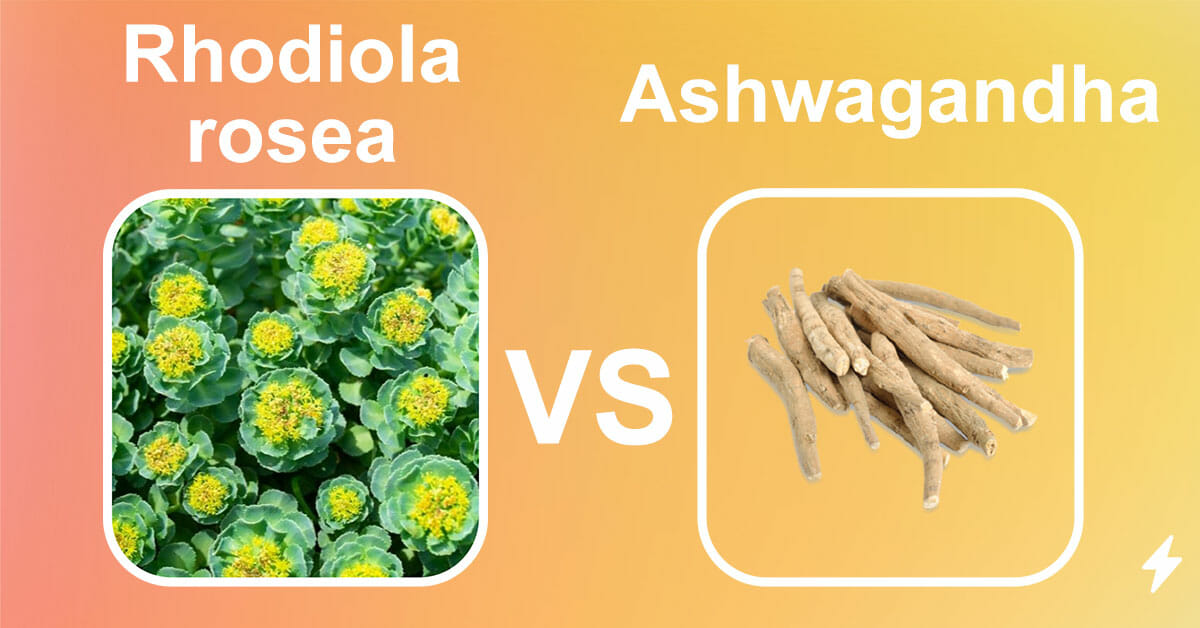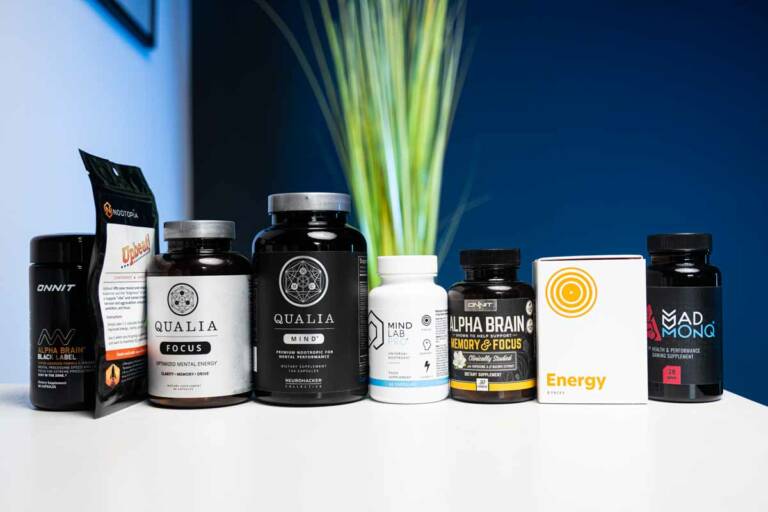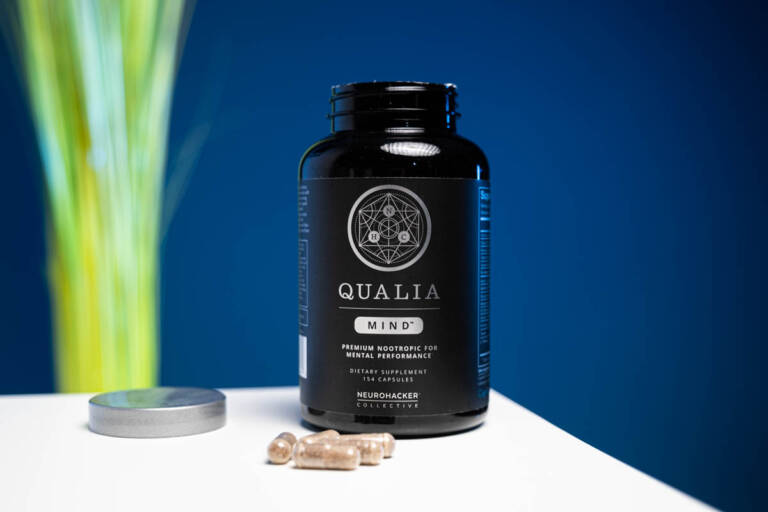Belonging to the herbal class of plants called adaptogens, ashwagandha and Rhodiola rosea enjoy a long history in both traditional and Indian Ayurvedic medicine.
For the most part, as standalone nootropics, ashwagandha is used to reduce stress and promote physical energy, whereas Rhodiola rosea is better known for the invigorating effect it produces.
So, let’s assess which of the two compounds is a better choice for you.

Benefits Of Both Adaptogens
Ashwagandha and Rhodiola rosea are adaptogenic herbs with similarities, yet the two are different. Whereas the former boasts soothing effects, the latter is considered the more energizing one.
That said, the two adaptogens overlap quite a bit in the benefits they deliver.
Working Mechanism Of Ashwagandha Vs Rhodiola
Many of the benefits of ashwagandha are attributed to its anti-inflammatory potential and ability to regulate cortisol levels.
The ashwagandha plant contains important bioactive compounds such as amino acids, alkaloids, lactones, and glycosides that inhibit inflammation and support the immune system along with its other health benefits.
Rhodiola’s therapeutic benefits, on the other hand, are linked to its impressive chemical compound content, including rosavin and salidrosides that can help stimulate the central nervous system and improve mental and physical performance while boosting overall health.
And unlike ashwagandha, which addresses stress relief by reducing cortisol, Rhodiola does so by limiting burnout symptoms.
Benefits Of Ashwagandha
Taking ashwagandha is most prominently associated with calming the central nervous system by reducing chronic stress and mental fatigue and promoting a calm mood in the long run.
Research shows that much of this is directly achieved by normalizing cortisol levels, the dreaded stress hormone.
Also, as a nootropic, ashwagandha may improve brain function by improving cognition, memory, concentration, and mental focus.
Improves Cognitive Performance
According to different studies, taking ashwagandha may enhance brain function, memory, and cognitive performance.
For instance, in mental health, studies suggest ashwagandha improves mild cognitive impairment (MCI) symptoms.
Ashwagandha was administered to 50 participants diagnosed with MCI who reported symptoms including general forgetfulness, difficulty with decision making, and drifting thoughts as common occurrences.
When treated with 300 mg of ashwagandha as opposed to a placebo group, the control group showed higher scores, indicating the benefits of ashwagandha on memory and cognitive function. [*]
Anxiety And Stress Relief
Ayurvedic medicine has traditionally used ashwagandha to treat chronic stress and anxiety for a long time. Several studies corroborate these benefits as it shows to lower cortisol levels, manage stress, and alleviate depression symptoms. [*]
The anxiolytic effects may also be helpful in reducing stress in people suffering from nervous depletion and sleeplessness.
Other research links ashwagandha to yielding stress-relieving properties even without measuring the stress hormone cortisol.
Improves Sleep
Taking an ashwagandha supplement may also improve sleep quality with the potential to treat conditions like insomnia.
Preliminary clinical trials show that taking ashwagandha may assist individuals in falling asleep faster, sleeping for longer, and experiencing better quality sleep.
According to one study, after taking ashwagandha root for six weeks, study participants reported their sleep improving by 72% on average. [*]
Reduces Inflammation
Human studies on ashwagandha establish this herb to promote the activity of natural killer cells and immune cells fighting infection to keep people healthy. Other studies show its ability to reduce inflammatory markers like C reactive protein (CRP).
Regarding inflammatory conditions like rheumatoid arthritis (RA), one study indicated that when you combine ashwagandha with other ayurvedic treatments for arthritis, ashwagandha powder extract could potentially ease painful and swollen joints in RA patients.[*]
Increases Muscle Mass And Strength
Ashwagandha may boost athletic performance by enhancing muscles and strength. Studies have specifically investigated muscle gain versus fat reduction, showing that people who took an ashwagandha supplement showed a significant improvement in muscle mass and strength. [*]
In another study, healthy adult males who took ashwagandha root extract while engaging in resistance training for eight weeks experienced higher muscle strength and size than the placebo group.
Researchers also found that supplementing with ashwagandha may also assist in supporting healthy testosterone levels, followed by a greater decrease in body fat percentage.
May Lower Blood Sugar And Blood Pressure
Ashwagandha may help balance blood sugar levels and manage diabetes, as shown by a few human clinical trials in this area.
According to one study, ashwagandha may reduce blood sugar levels much as oral diabetes medication in people with type 2 diabetes. [*]
Another study showed ashwagandha lowers fasting blood sugar levels when taken at a higher dose.
Some people even take ashwagandha to improve heart health with its ability to reduce blood pressure and lower high cholesterol and triglycerides. [*]
But if you already suffer from low blood pressure, then this adaptogen may not be for you.
May Boost Sexual Function And Fertility
Promising research indicates that ashwagandha may increase testosterone and improve male fertility.
It may be instrumental in increasing sperm count, sperm quality, and sperm motility. [*]
Benefits Of Rhodiola
Rhodiola rosea also offers all the benefits of a potent adaptogen. It is known for reducing symptoms of chronic fatigue syndrome that result from low energy levels and promotes feelings of well-being.
For instance, anyone looking to improve physical performance and athletic performance will often add Rhodiola rosea to their workout routine.
Improves Brain Function
In a nootropic capacity, Rhodiola is believed to help with improving cognitive function.
Some studies have documented Rhodiola to work as a gentle treatment for several mental health conditions, including stress, and for reducing mild depression symptoms.
It may also assist the nervous system by promoting neurogenesis by repairing and growing new nerve cells under stress, alongside neuroprotection that protects nerve cells from free radicals.
Helps Boost Mental Energy
Rhodiola rosea, also known as the arctic root, has been studied to fight physical and mental exhaustion and improve physical energy.
While its ability to boost physical stamina when tackling exhaustion and fatigue from low energy has already been established, new research is now looking into its potential to lower symptoms of mental fatigue like brain fog or low concentration.
One study involving an 8-week administration of Rhodiola to people with chronic fatigue symptoms showed the symptoms to improve for as long as Rhodiola was administered. [*]
Improves Resistance To Stress
People who experience stress constantly often use Rhodiola to manage their stress levels.
Research shows that Rhodiola can relieve stress by lowering cortisol levels. Excess cortisol is associated with several stress-induced symptoms, including hormonal imbalances, binge eating, excessive weight gain, a weakened immune system, and even premature aging.
By managing cortisol, however, Rhodiola can improve the adrenal system’s health and regulate mental and physical stress levels.
Related studies show that the herb can help restore normal eating and sleeping patterns after stress.
Reduces Anxiety And Depression Symptoms
Among other benefits of Rhodiola, it works as an adaptogen and regulates neurotransmitter levels, including dopamine and serotonin.
Among these, dopamine is responsible for controlling the brain’s reward, motivation, and pleasure centers, while serotonin regulates emotions such as happiness.
In functional medicine, Rhodiola is often used as a natural substitute for antidepressant medications without presenting any of the associated side effects of such drugs.
Findings from a clinical trial that administered Rhodiola to people with depression showed complete remission of symptoms for 2/3 rds of the participants after using the herb for one month.
Another study found that using Rhodiola for 10 weeks may reduce symptoms of generalized anxiety disorder. [*]
Enhances Exercise Performance
The golden root plant has impressive energy-enhancing properties, given its potential to increase red blood cell count.
Since red blood cells carry oxygen and nutrients to muscles, a timely supply can prevent muscle fatigue while improving exercise performance.
There is also some evidence that Rhodiola has anti-inflammatory features which can assist rapid muscle recovery and enhance endurance performance.
One study involving female participants showed that women who took a higher dose of Rhodiola were able to run faster than others who were given a placebo. [*]
Presents Anticancer Properties
Rhodiola contains several phenolic compounds with potent antioxidant properties.
Based on preliminary evidence from animal studies, the herb lowered anti-cancer drug toxicity while improving its anticarcinogenic effects.
Effective For Diabetes Management
Rhodiola has also been used to help lower blood sugar in diabetic individuals.
Research indicates that Rhodiola plays a part in increasing the number of glucose transporters allowing the body to move glucose into cells more effectively.
This is corroborated by one animal study where Rhodiola balanced low blood sugar by increasing the number of glucose receptors in cells. [*]
Plus, as Rhodiola regulates cortisol, it may also prevent symptoms like insulin resistance.
Available Forms Of Ashwagandha Vs Rhodiola
Both ashwagandha and Rhodiola are available in different forms to suit different people’s needs.
For instance, ashwagandha is sold in the form of powder, liquid extract, capsules, tinctures, or even tea.
Likewise, Rhodiola is also available in all these forms. The two herbs cater to people who may not enjoy swallowing pills such as tea, tincture, or liquid extract.
Or they can be used as a dietary supplement in tablet or capsule form, making it easier to determine the amount or dosage used in pills.
However, unlike ashwagandha, which should be taken with food, it is recommended to take Rhodiola on an empty stomach for optimal absorption.
Ashwagandha Vs Rhodiola Dosage
There is no officially recommended dosage for either ashwagandha or Rhodiola.
However, scientific studies have worked with dosages of 500 mg divided into two daily doses for ashwagandha.
- For sleep-related concerns, experts recommend using 250-600 mg for a maximum of three months.
- To manage cortisol levels, 500-600 mg is recommended once daily for a maximum of 12 weeks.
- To regulate blood glucose levels, take between 250-300 mg daily split into two or three equal doses.
Taking Rhodiola will also depend on why you are taking this natural supplement. Doses, as seen in scientific studies, are considered safe and optimal when taken as mentioned below:
- For optimizing athletic performance, take between 170-200 mg daily
- Experts recommend taking 340 mg of Rhodiola divided into a single or two daily doses to manage symptoms of moderate depression
- 50 mg of Rhodiola daily is recommended for preventing fatigue
- To manage generalized anxiety disorder, studies show 170 mg of Rhodiola to be optimal when taken twice a day
- Take 200 mg twice a day to improve your stress response
You should start with a smaller dose of both these natural supplements and then work your way up to see how well your body reacts.
Ashwagandha Vs Rhodiola Side Effects
Overall, both natural supplements are generally considered safe to use and seem well tolerated by most people.
However, people with an overactive thyroid need to be careful when using ashwagandha as it can increase thyroid function by boosting the conversion of thyroid hormones.
Other individuals who should not use ashwagandha or only use it under supervision include pregnant or nursing women, people with low blood pressure, an autoimmune disorder, or anyone taking sedatives.
Likewise, since Rhodiola stimulates the immune system, anyone with an autoimmune disorder should not use Rhodiola without consulting their healthcare provider.
Rhodiola may also lower blood pressure and blood sugar, so people with these concerns should only take Rhodiola under medical supervision.
Verdict
The face-off between ashwagandha vs rhodiola does not present a single winner as the reason for taking one adaptogen over the other is relative to what you are looking for.
For instance, people who are looking to address anxiety concerns or want to feel more relaxed will likely opt for ashwagandha. But others who want to improve their stamina and energy levels will prefer to take rhodiola.
But if you want to benefit from the combined effects of the two, they let the body function optimally in different areas of stress relief, immune support, focused energy, and brain health. To achieve all this and much more you can take the two together in daily doses or opt for a premade stack.






